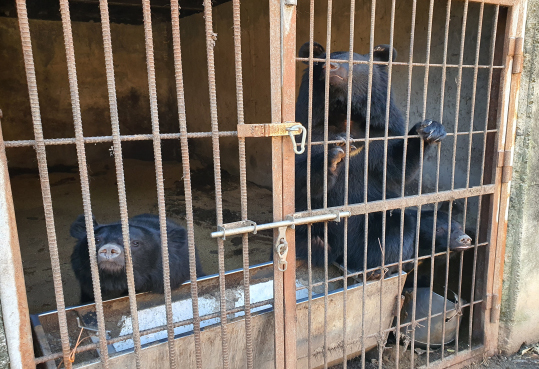
Bear bile farming will be fully banned in Korea from 2026.
The Ministry of Environment announced Wednesday, it would put a stop to breeding bears for bile farming by 2025.
Korea is one of few countries that allow bear bile farming. As of 2021, there are 24 bear bile farms across the country with a total of some 360 bears.
In bear bile farming, bears are kept in captivity to harvest their bile, a digestive fluid produced by the liver and stored in the gallbladder, which is used by some traditional Asian medicine practitioners. Though the country banned the import of bears for farming in 1985 to comply with the Convention on International Trade in Endangered Species of Wild Fauna and Flora, it allowed preexisting farms to continue the practice of killing caged bears at age 10 or older for bile extraction.
The Ministry of Environment announced Wednesday, it would put a stop to breeding bears for bile farming by 2025.
Korea is one of few countries that allow bear bile farming. As of 2021, there are 24 bear bile farms across the country with a total of some 360 bears.
In bear bile farming, bears are kept in captivity to harvest their bile, a digestive fluid produced by the liver and stored in the gallbladder, which is used by some traditional Asian medicine practitioners. Though the country banned the import of bears for farming in 1985 to comply with the Convention on International Trade in Endangered Species of Wild Fauna and Flora, it allowed preexisting farms to continue the practice of killing caged bears at age 10 or older for bile extraction.

Most of the bears in farms are moon bears, also known as Asiatic black bears, designated as an endangered animal species in 1982 by the Cultural Heritage Administration.
Aware of the international criticism against the bear bile farming practice, the ministry has been supporting the sterilization of bears in farms since 2014, but was not able to put a stop to illegal breeding.
To end bear bile farming, the Environment Ministry formed a committee in August consisting of bear farmers, members of animal right groups and experts, and have recently come to an agreement to officially end bear farming by 2025.
Bears at farms will be transferred to sanctuaries, which will newly open in Gurye, South Jeolla Province and Seocheon, South Chungcheong Province by 2025. The ministry is currently working on building the protection facilities.
Animal rights groups plan to purchase bears from farms through receiving donations.
The ministry added it will work on the legislation of laws to ban bear farming and require related protection measures.
“The announcement means a lot as it shows that Korea is trying to do what it can to protect the internationally endangered species,” the ministry said.
Aware of the international criticism against the bear bile farming practice, the ministry has been supporting the sterilization of bears in farms since 2014, but was not able to put a stop to illegal breeding.
To end bear bile farming, the Environment Ministry formed a committee in August consisting of bear farmers, members of animal right groups and experts, and have recently come to an agreement to officially end bear farming by 2025.
Bears at farms will be transferred to sanctuaries, which will newly open in Gurye, South Jeolla Province and Seocheon, South Chungcheong Province by 2025. The ministry is currently working on building the protection facilities.
Animal rights groups plan to purchase bears from farms through receiving donations.
The ministry added it will work on the legislation of laws to ban bear farming and require related protection measures.
“The announcement means a lot as it shows that Korea is trying to do what it can to protect the internationally endangered species,” the ministry said.




















![[Today’s K-pop] BTS pop-up event to come to Seoul](http://res.heraldm.com/phpwas/restmb_idxmake.php?idx=642&simg=/content/image/2024/04/17/20240417050734_0.jpg&u=)